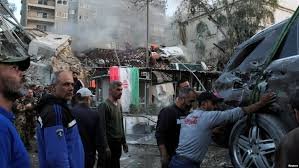Efforts to issue a UN Security Council statement condemning the recent attack on Iran’s embassy compound in Syria hit a roadblock as the United States, Britain, and France voiced opposition. The attack, which Iran has attributed to Israel, remains under scrutiny for its circumstances, with conflicting narratives surrounding the incident.
Russia, in response to the Western stance, criticized what it deemed as double standards in addressing international incidents. Dmitry Polyanskiy, Russia’s deputy UN Ambassador, underscored the need for consistency in upholding legality and order on the global stage.
While condemnation of attacks on diplomatic premises is not uncommon, the European Union joined in expressing concern over the strike, emphasizing the imperative of respecting the sanctity of diplomatic and consular premises and personnel.
Amidst ongoing investigations, the US expressed apprehension regarding the status of the targeted building, particularly if it indeed housed diplomatic facilities. Israel, however, has not officially claimed responsibility for the attack, which resulted in casualties among Iran’s Revolutionary Guards.
Iran, invoking international law, cited provisions from the Vienna Conventions of 1961 and 1963, defining diplomatic and consular premises as inviolable. These conventions outline the permissible use of such premises for diplomatic functions while prohibiting activities incompatible with their purpose.
Moreover, Iran referenced the 1973 Convention on the Prevention and Punishment of Crimes Against Internationally Protected Persons, including Diplomatic Agents, suggesting that the victims were covered under its provisions. As diplomatic tensions simmer, the incident underscores the complex interplay of international legal frameworks and geopolitical dynamics.



